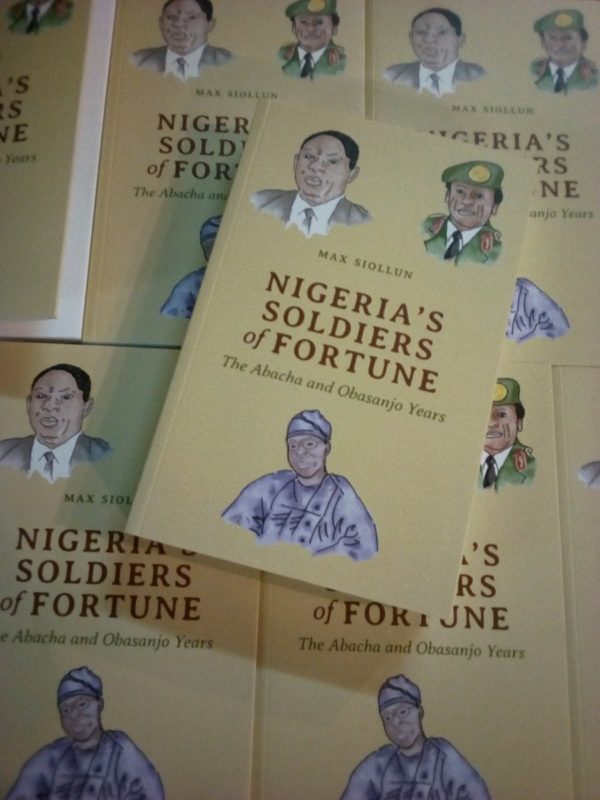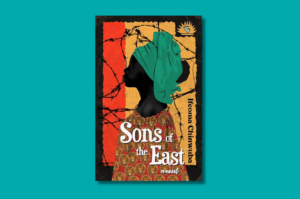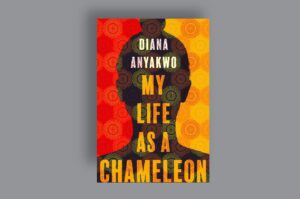
Only three of Nigeria’s living heads of state, current and former, have bothered to write a biography. Given its leaders’ refusal or reluctance to record their stewardship, or to promote the study of history in schools, Nigeria’s history has frequently consisted of urban legends, personal beliefs and rival conspiracy theories that vary depending on the ethnicity, geographic origin or religion of the narrator.
— Max Siollun, Nigeria’s Soldiers of Fortune: The Abacha and Obasanjo Years.
HERE IN America, it should be winter, but the season cannot make up its mind, it would like to be spring, I think. In this balmy space, I am comforted by Max Siollun’s riveting book, Nigeria’s Soldiers of Fortune: The Abacha and Obasanjo Years. Crisp, disciplined sentences and an engaging pace plus expert descriptions of colorful characters. This is how history should be written. If the history books of my childhood had been this accessible, I would probably have been a historian today. There are many things I did not know about those dark years between 1993 and the Obasanjo years.
Max Siollun is one of Nigeria’s best kept open secrets. He is a historian and the author of the books Oil, Politics and Violence: Nigeria’s Military Coup Culture 1966-1976 and Soldiers of Fortune: A History of Nigeria (1983-1993). He has a content-rich blog; subscribe to it and have your fill of the history of important events like the Nigerian Civil War.
The burden of the book itself is an excellent conversation starter. The first thing the reader notices is that throughout the era in discussion, there is a loud absence of ideology or rigorous thinking among the ruling and intellectual elite. It is mostly low-level governance and thinking. Why are things the way they are in Nigeria? Why democracy? Where is Nigeria headed? What should be the appropriate structure of governance and economy for Nigeria? Siollun’s book is at once deeply engaging and scary. Scary on at least one level: Democracy has not made Nigeria safer and more secure for anyone than during the Abacha years. Think about that. It is all a puzzle. Our ruling and intellectual elite are determined to prove to the world that we are not human beings in the traditional sense of a shared humanity. Perhaps they are right and many of us are in denial. It is maddening, though, that the more you think of our condition, the more you are tempted to simply keep quiet and enjoy what’s left of your existence. Nigeria is not normal.
Siollun’s absorbing narrative shows Nigeria in the vice grip of an equal-opportunity elite—a tribe of soldiers, intellectuals, writers, clergy, etc. united in screwing Nigeria for fame and fortune. This is history. There are sad reminders of the devastation that anti-intellectual philistinism has wreaked on the nation. Chief Obafemi Awolowo seems to be the last Nigerian leader referred to as a thinking intellectual. The ones after are fez-donning, eyeglass-wearing comic mimics.
The book is organized into numbered chapters with their own titles, and each is virtually a stand-alone booklet offering entertaining and informative insights. “Children of Oduduwa” addresses and contrasts the politics and ambitions of Chiefs Awolowo and MKO Abiola. “Stepping Aside” provides an overview of the annulment of the elections by Ibrahim Babangida and analyzes Ernest Shonekan’s role in it. “82 Days” is an analysis of the turbulent interim period presided over by Shonekan, the hapless puppet of the military. “The Khalifa” and “He Said She Said” reflect on the military’s incursion under Abacha—and pointedly make the case that Abiola and his supporters were initially jubilant at the return of the military. “Confrontation” and “Enough is Enough” introduce the beginning of the pro-democracy struggle with NADECO and the Southwest intellectuals taking a lead. It is more of an editorial than clinical history, but it is a powerful analysis. “The ‘Phantom Coup’” and “The Weeping Generals” are, together, a highly entertaining account of the coup that roped in General Oladipo Diya (The Crying General), Shehu Musa Yar’Adua, and Olusegun Obasanjo. That chapter alone is worth the price of the book.
“The Ogoni 13” is perhaps one of the most important; it traces the gory events that led to the trial and hanging of Kenule Saro-Wiwa. “Murder Inc.” tracks the persecution, maiming and killing of opposition figures. “Five Leprous Fingers” is an analysis of the five political parties set up by Abacha on yet another new road to democracy. “A Coup from Heaven” and “Divine Intervention” are colorful chronicles of the deaths of Abacha and Abiola and the machinations that ultimately led to democracy in 1999 under Olusegun Obasanjo.
“Nigeria Inc.” appears to be a filler chapter that ruminates on Nigeria’s checkered past and experiments with various governance structures, and on the Nigerian civil war. “End of the Road,” “Power Shift,” “Uncle Sege,” and “People of the Book” interrogate life in Nigeria under Olusegun Obasanjo with the roles of the new Christianity (Pentecostalism) and Islam thrown in. It is an important chapter on the impact of religion in shaping the new Nigeria. “Back to the Future” is a final commentary on the five men—Abacha, Abiola, Obasanjo, Babangida, and Abubakar—who shaped the Nigeria of that era.
Siollun’s book gives context to the new fascism enabled by writers and intellectuals. Nigeria needs new voices of integrity and passion pining for a new country. What we have is a killing field. We need new Funmilayo Ransome-Kutis, Chinua Achebes, and Gani Fawehinmis.
Although the focus is ostensibly on the years between the Abacha and Obasanjo reign, Siollun veers in and out of his self-assignment to give readers luscious peeps into history beyond those years. He engages in analysis with an awareness of irony:
1993 was a year of farce—even by Nigerian standards. It featured a presidential election that cost 15% of GDP, only to be retroactively declared void; the military displacement of a civilian government; and three different governments on three months.” (Pg. 31).
And he has strong opinions which he shares freely:
Following a meeting between Babangida and traditional rulers on July 2, 1993, the foremost Yoruba traditional ruler, the Ooni of Ife, Okunade Sijuwade, had threatened that Yorubas would secede if Abiola was not declared president. Less than one month after Abacha seized power in November 1993, the same Oba Sijuwade, who had threatened to pull his people out of Nigeria, led 18 of the Yoruba obas to Dodan Barracks on a courtesy visit to Abacha and commended him for “pre-empting and forestalling the imminent state of war and disintegration” in Nigeria. The Oba of Lagos, Adeyinka Oyekan, also wrote a letter to Abacha telling him: “It is by the grace of Allah that as a crowning of all your achievements, you should become head of state and commander-in-chief.” (Pg. 53).
Siollun called it “Yoruba flip-flopping.” That’s pretty bold.
The references in the book are priceless. Sadly, only motivated scholars will have the time and the aptitude to go hunting for them. I envision a digital collection of all the references that are accessible to this generation—point and click. In the digital age, the age of Trump’s rage, people are reading the wrong things. In Nigeria, history has been pretty much absent from the classroom for a very long time, the young will only be found giggling at their phones as they lap up half-truths on WhatsApp and in churches.
But then it is not all the readers’ fault. Many wail that Donald Trump has tweeted over 266,000 words, more than James Joyce’s novel Ulysses, which has 264,000. There’s a lesson there. Millions all over the world have read every word of that vile man’s tweets. How many have read Ulysses? How many Nigerians have read Siollun? Writers should write where readers read. It’s a failure of intellectual leadership, and it explains why, today, orthodox literature is largely a hustle, irrelevant to real narrative, and, unlike Trump’s drunken drivel, incapable of shifting the world one iota. We should worry about these things: people are reading the wrong things on social media while awesome thinkers like Siollun wring their hands in despair.
I hope that Siollun writes a sequel that interrogates the role of Internet warriors in the pro-democracy years. It is not often known, but one of the first dividends of the arrival of the Internet and mailing lists in the early nineties was the ability to harness resources and intellectuals across continents to fight the hell that was Abacha’s reign. If those servers could talk, the world would be shocked. It is a shame that what many fought for so ferociously has been turned into a farce.
Finally, Siollun makes this point: “Perhaps the military’s greatest contribution to Nigeria’s democracy was to rule long and badly enough to thoroughly ruin its reputation and disabuse the public from considering it as an alternative government to civilians.” Well, Siollun did not anticipate the disaster that has been the second coming of Buhari. I did say he is a good historian; I didn’t say he is a seer.
ABOUT THE WRITER
Ikhide R. Ikheloa is a social critic.









Book Review on the Abacha to Obasanjo Years: Nigeria’s Soldiers of Fortune | Nigerian History Channel April 13, 2020 08:29
[…] is a review of my latest book written by Ikhide Ikheloa and published on Brittle Paper magazine website. You can buy the book from these […]